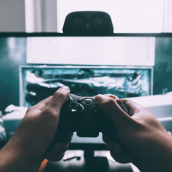
Hot topics
The importance of IPR valuation
Discover why you need IP valuation, the different methods for the valuation of IPR portfolios, and how to get started with IPR valuation exercises.
Keep up to date by subscribing to our newsletter Perspectives.

Discover why you need IP valuation, the different methods for the valuation of IPR portfolios, and how to get started with IPR valuation exercises.

Discover answers to frequently asked questions about intellectual property in the fast-moving consumer goods (FMCG) sector, from how to manage new product development to building your FMCG branding strategy.

The EUIPO has refused the attempt by the Piaggio Group, manufacturer of the iconic Vespa, to register a three-dimensional trademark representing the shape of a scooter. The failure of the 3D trademark registration illustrates once again the difficulty of protecting non-traditional trademarks.

How distinct are the retail services of shops that offer only one brand's products (such as flagship stores) from those that sell products from multiple brands (such as department stores)? This was the question at the heart of the recent Rituals trademark class decision at the CJEU, as Sven Valstar explains.

The rapid dissemination of AI-generated images in the style of the famous Japanese Studio Ghibli on social media will probably not have escaped your attention. This new trend raises some important legal and ethical questions about generative AI and copyright, as Gaëlle Andrieu explores.

As the popularity of esports and gaming has grown, so have associated legal issues, including those related to IP law. Alban Radivojevic explains how the newly established International Games and Esports Tribunal (IGET) is expected to assist.

The '2024 Review of Notorious Markets for Counterfeiting and Piracy' by the US Trade Representative (USTR) reveals some positive developments in anti-counterfeiting by e-marketplaces but an alarming rise in the sale of counterfeit medicines by illegal online pharmacies.

The EU Artificial Intelligence Act (EU AI Act) establishes the first-ever horizontal regulatory framework dedicated to AI within the European Union. Catherine Caspar outlines the purpose and parameters of the ambitious regulation.

Discover what conscious acquiescence is and how it may impact your ability to enforce your rights against any younger trademark registrations you have tolerated.

Brand protection is a holistic process involving multiple stakeholders. Matteo Mariano explains why you should involve your trademark attorneys early in your brand project.

As consumer appetite for healthy and functional alternatives grows, trademark applications for healthy food branding have spiked. However, there is a limit to the health and nutrition benefits you can claim in a food or drink trademark. Discover how consumer trends translate into healthy food branding, food trademark applications and IP in the food industry.

Generative AI systems are often trained with protected works. At the same time, they are used to produce content (images, text, music, videos...), so what are the implications for the copyrights of the creations provided to the system and those it creates? Our expert offers the Swiss perspective on copyright protection and AI.